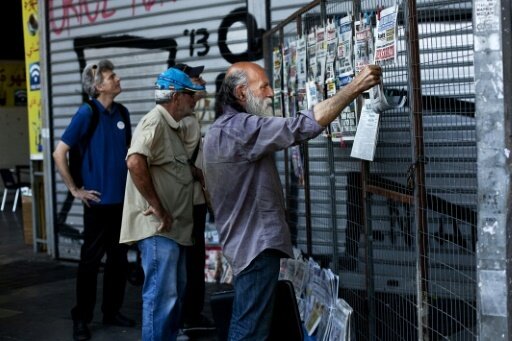The Greek parliament has approved the second batch of reforms the debt-laden country needs to implement in order to receive a new bailout from its worldwide creditors, despite intense protests in Athens against the austerity measures.
Tsipras reiterated that his government was forced into making a hard choice of accepting tough reforms at the threat of a Greek euro exit, which he said remained on the mind of some of the country’s partners.
The Greek bill passed by a resounding 230 votes out of the 298 members of parliament present, after a marathon debate stretching into the early hours.
Prime Minister Alexis Tsipras was unable to forestall a second revolt in a week among his own Syriza party lawmakers, but had no trouble passing the draft legislation with the backing of pro-European opposition parties.
Government spokeswoman Olga Gerovassili admitted the government was facing a “political problem” and said “planned procedures” would be implemented to address it. “The divide in the parliamentary majority is clear”, she told reporters after the vote.
Gerovassili said negotiations with Greece’s creditors would resume immediately after Thursday’s vote.
The hope on both sides is that the discussions will conclude by August 20 when Greece has a payment of a little more than 3 billion euros ($3.2 billion) due to the European Central Bank.
Many in Tsipras’ Syriza party, including former finance minister Yanis Varoufakis, voted against last week’s austerity measures, which included big increases to sales taxes that took effect on Monday.
ATHENS Greek Prime Minister Alexis Tsipras on Thursday pledged his government would never allow banks to seize the primary residences of Greeks as parliament prepared to vote on a bill that toughens rules on foreclosures.
Officials from Greece’s three creditor institutions – the European Commission, European Central Bank (ECB) and global Monetary Fund (IMF) – were reportedly expected to arrive in Athens on Friday to start holding meetings with the government. No injuries or arrests were reported but a few protesters threw petrol bombs at police, it was reported.
Tsipras received a boost on Tuesday when Standard & Poor’s raised its credit rating on Greece by two notches to CCC+ from CCC-, still in junk territory but a step in the right direction.
Speaking before the vote, Mr Tsipras stressed that he was not happy with the deal that had been imposed upon him by the rest of the eurozone.
Mr Tsipras himself, who is associated with the moderate wing of his party, has publicly said he disagrees with measures demanded.
The measures are part of the conditions agreed to in Brussels on July 13 after negotiations on securing up to 86 billion euros (94 billion dollars) in global financing for Greece’s beleaguered economy.
The second package, among others includes rules on propping up failed banks, decreed after the 2008 financial crisis and aimed at shielding taxpayers from the risk of having to bail out lenders. Though the annual deficit has been reduced dramatically, the country’s debt burden has risen as the Greek economy has shrunk by around a quarter.
